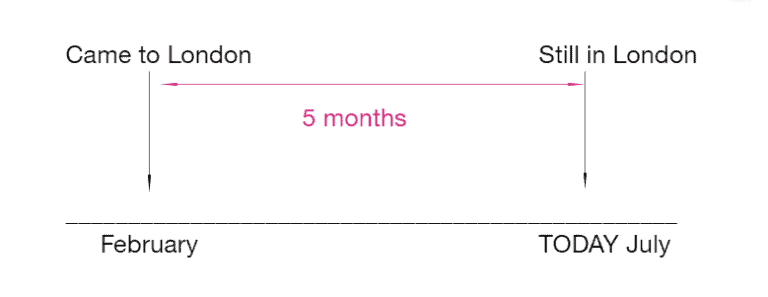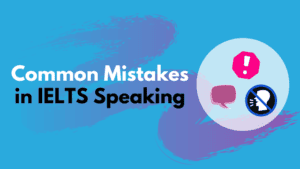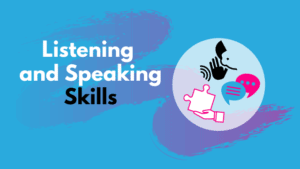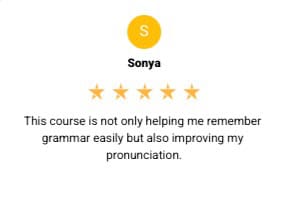Common Grammar Mistakes While Speaking English
Having taught IELTS for a number of years, I see students making very similar, common grammar mistakes in their IELTS Speaking test, and this brings their score down.
If you know what these mistakes are, then you can be ready to hear them and fix them.
In this article, I am going to tell you 6 of the most common grammar mistakes students make when speaking English.
Table of Contents
Common grammar mistake #1: The present perfect
So let’s look first at a very common mistake students make when speaking English, and this one is to do with tenses.
Can you spot the mistake in the sentence below?
I came to London to work, and now I live here for 5 months ☹️
The correct sentence should be as follows:
I came to London to work, and now I have lived here for 5 months 😁
Here you should be using the present perfect tense, but many students use the present simple tense, often because this is the tenses they would use in their own language in this scenario.
In English we use the present perfect tense when an activity started in the past, continues now, and you are now stating the duration of that activity.
You can also see this in the timeline below:

In the above situation, I came to London 5 months ago, I still live here now, and I am saying how long I have stayed in London. I would say,
“I have been here for 5 months”
OR
“I have been here since February”
Here, we use ‘for’ with a period of time (1 day, 5 weeks, 2 months…)
However, we use ‘since’ with a point in time (last week, the 5th of Match, February…)
Grammar mistake #2: Confusing the ‘s’ with verbs
The next common grammar mistake is partly to do with the conjugation of verbs and partly to do with pronunciation.
Can you spot the mistake in the sentences below?
He usually go alone to the gym
He do not go with his friends
The correct sentences should be as follows:
He usually goes alone to the gym
He does not go with his friends
In the present simple tense, the ‘third person’ (he, she, it) takes ’s’ on the verb. For example,
- He goes to the gym
- He works out
- He enjoys himself
Even if you know this, you may often forget to pronounce the /s/ sound. So, remember to pronounce it clearly.
In the negative of the present simple third person (he, she, it) we use ‘does’.
You can think of the ’s’ as going on the auxiliary ‘do’.
Grammar mistake #3: Using continuous tenses
The next mistake is the overuse of continuous tenses.
Can you spot the mistake in the sentences below?
I am liking this Netflix series
I am having a big family
The correct sentences should be as follows:
I like this Netflix series
I have a big family
This is simply because the Present Continuous tense is usually used with actions. However, in the examples above these are not actions, they are (more permanent) states.
The Present Continuous is formed as follows:
SUBJECT + BE + VERB + ING
I + am + watching
There is a group of verbs in English that are nearly always used in the present simple tense (not the present continuous) because they refer to states not actions. The most common ones are,
- like, love, prefer, hate
- believe, know
- understand, realise
- want, wish
Grammar mistake #4: Confusing ‘been’ and ‘gone’

The next mistake when students speak English, especially in the IELTS Speaking test, is when students confuse two past participles; ‘been’ and ‘gone’.
In the following example, the scenario is about a young man Tom who is calling to visit Janet who lives with her mother. Janet lives with her mother in Manchester.
Can you spot the mistake in the dialogue below?
Tom: Is Janet home?
Janet’s Mum: No, I am sorry, she has been to London
The correct sentences should be as follows:
Tom: Is Janet home?
Janet’s Mum: No, I am sorry, she has gone to London
There are 2 past participles of the verb ‘to go’
- BEEN
‘been’ is used to say she went and came back.
- GONE
‘gone’ is used to say she went and is still there (hasn’t come back yet).
Clearly in the above example, Janet cannot speak to Tom, because she is in London at the moment, not at home. She has not come back yet.
Common grammar mistake #5: Countable nouns
The next mistake is another very commo grammar mistake in IELTS Speaking and is usually due to students confusing countable and uncountable nouns.
Can you spot the mistake in the sentence below?
My dad is always giving me lots of advices.
The correct sentence should be as follows:
My dad is always giving me lots of advice.
Advice is an uncountable noun, so it cannot take a plural.
Other common uncountable nouns that often appear in IELTS and are often wrongly put in the plural, include,
- News
- Information
- Knowledge
- Research
- Work
- Equipment
- Luggage
- Pollution
- Furniture
- Weather
Be careful when you hear yourself using these words and just remember, they need to be in the singular.

Common grammar mistake #6: Confusing time questions
The following questions about length of time, are often asked and answered incorrectly by students.
Can you spot the mistake in the questions below?
How many time have you lived here?
How long time have you lived here?
The correct sentence for both of these should be as follows:
How long have you lived here?
Quite simply, we don’t use ‘time’ with ‘long’. Whatever the tense, we should just say, ‘how long…?’
If we use ‘many’, then ‘time’ becomes countable and refers to the number of times you do something. The answer would be once, twice, three times and so on.
How many times have you seen that film?
I’ve seen it twice, it’s great!
In fact, it is also possible to say, ‘how much time…?’ However, not in the above examples, as it wouldn’t sound very natural.
‘How much time…?’ is usually used only for shorter periods of time. For example,
How much time do I have to finish this exam?
How much time does it take to boil an egg?
However, when asking about a longer period of time, we tend to use ‘how long…?’

That’s it!
Look out for these mistakes when you are speaking English and especially if you are doing your IELTS Speaking Test.
Let us know in the comments below, what is the most common mistake that you make?
Improve your Speaking Skills with this Free Course
Crack IELTS Speaking Part 1
Learn to Speak with Confidence in Part 1 of Your IELTS Test!
⭐️⭐️⭐️⭐️⭐️
‘It’s such a great course. I’ve learned so many usages for speaking part 1.’
Zu Htet






4 thoughts on “Common Grammar Mistakes While Speaking English”
Thank you! This was very useful!
Sanja
You are most welcome!
Where is your mock test clips, which you ask a question, then pause so I have time to answer. like IELTS atmosphere?.
It is appreciated to send me the direct link. I couldn’t find it.
BR,
Morteza
Here you go – https://keithspeakingacademy.com/ielts-speaking-practice-tests/